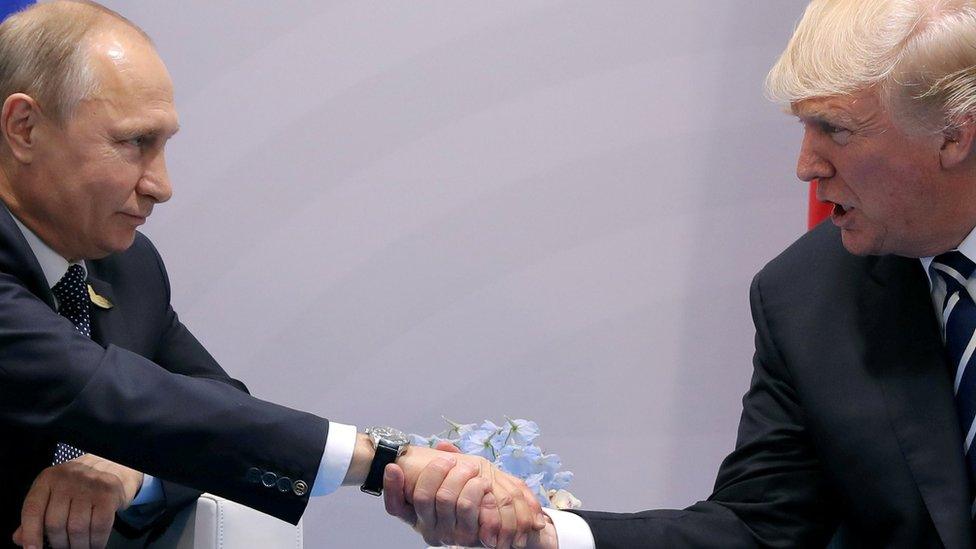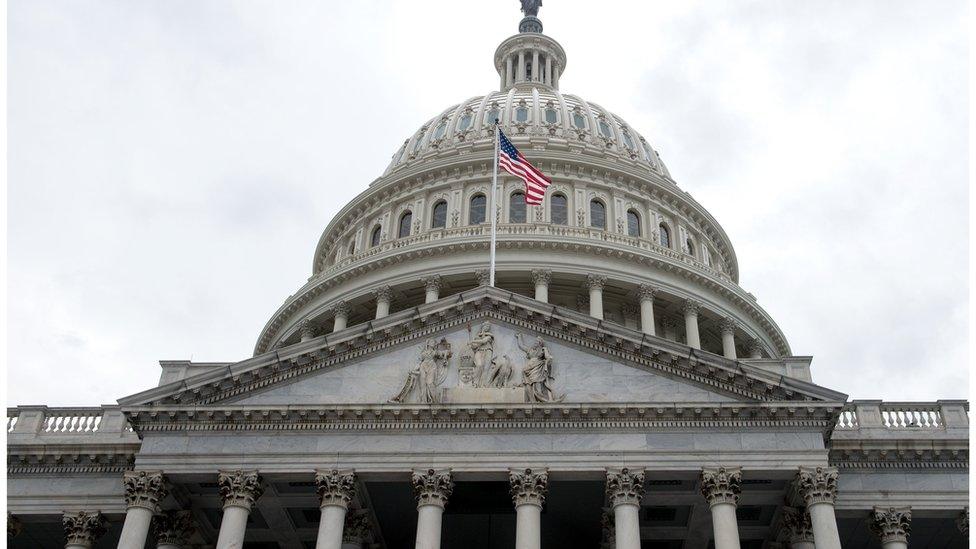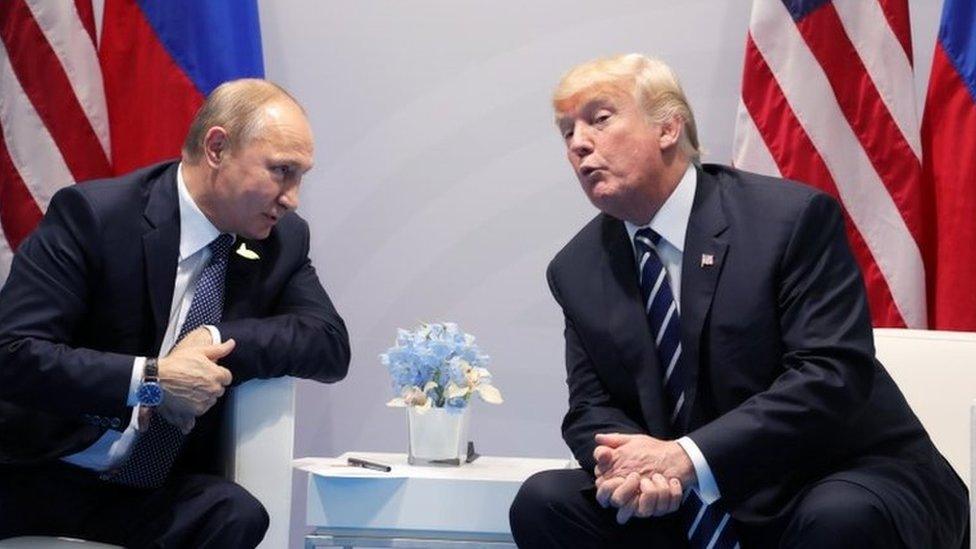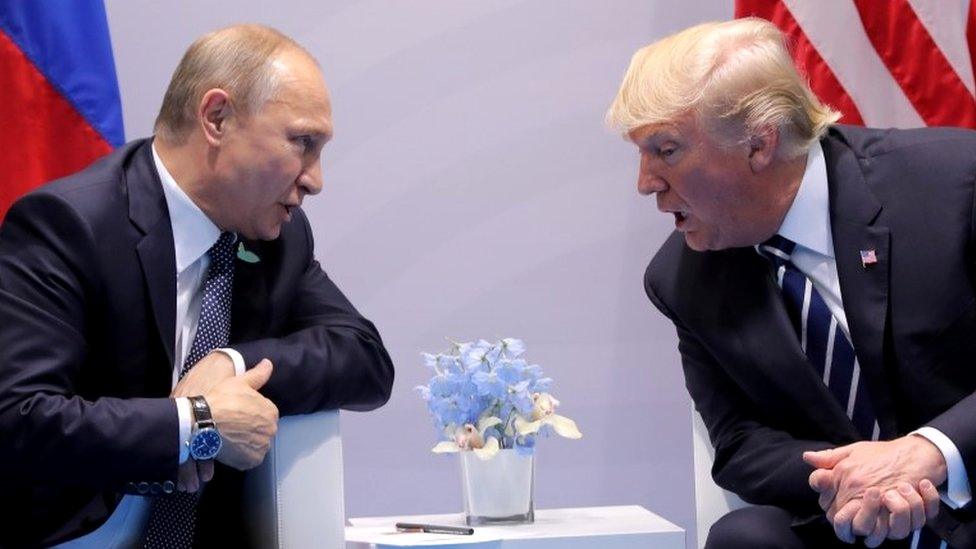US-Russia sanctions: How did we get here?
- Published

US President Donald Trump has signed a significant piece of legislation to punish Moscow for alleged interference in last year's election.
It limits the president's ability to dismiss sanctions against Russia and has caused the Kremlin to retaliate.

Why are there sanctions against Russia?
After Russia annexed Crimea and backed separatists in eastern Ukraine, in 2014, the Obama administration in tandem with the European Union introduced an array of economic sanctions on Russian individuals and businesses.
Many of the individuals targeted were linked to Russia's actions in Ukraine or were part of President Vladimir Putin's elite entourage.
Assets were frozen and restrictions imposed on Russia's oil industry, as well as its state finance, technology and arms sectors.
In December 2016, Barack Obama expelled 35 Russian diplomats and closed two Russian compounds in response to what the US intelligence community concluded was a Russian government-backed cyber-attack directed to influence the outcome of the 2016 presidential election. Moscow denies the allegation.


What's in the new legislation?
Members of the US Congress wanted to turn existing sanctions, and some new ones, into law. Both houses have Republican majorities, the same party as the president.
The bill tightens existing sanctions around the ongoing situation in Ukraine and imposes new measures including some in response to alleged hacking during the 2016 election and others that target key Russian industries such as the railways, shipping, metals and mining. It would also bring in restrictions on companies doing business with the Russian oil industry.

Why does it matter that the sanctions became law?
It means getting rid of sanctions becomes much harder, and the power to reverse the sanctions effectively moves from the hands of the president to Congress. Previously, the sanctions were introduced as executive orders, which any president has the power to remove instantly.
Under the new law, Congress must approve any request from the president to ease the financial penalties detailed in the bill. In order to waive individual sanctions, a president would need to submit a report to Congress outlining why it is in the national interest to take that action.

How has Russia responded?
The Russian government retaliated to the sanctions by telling Washington to reduce the number of its staff at the US embassy in Russia and seizing properties used by diplomatic officials. The US government will have to cut 755 staff to meet the capped figure of 455.
Sarah Huckabee Sanders, the White House press secretary, said the White House would support tough sanctions on Russia until the situation in Ukraine was "fully resolved". Without a clear end in sight, that could mean a long time.
In a Facebook post, the Russian Prime Minister, Dmitry Medvedev, said the law ended any hopes of improving relations between Moscow and Washington.

Why are some European countries unhappy with the planned changes?
The law signals a departure from a joint EU-US approach to Russian sanctions. And some European countries have economic concerns because the new law could penalise European companies that invest in big Russian infrastructure projects such as the new Nord Stream II pipeline to transport gas between Russia and Germany.
The German Foreign Minister, Sigmar Gabriel, and Austrian Chancellor Christian Kern said this part of the new sanctions programme would add a new negative dimension to US-European relations and Europe's energy supplies were "a matter for Europe, not for the United States".
But Germany is said to be pushing for EU sanctions against Russia to be stepped up, according to diplomatic sources quoted in Brussels.
The government in Berlin is said to want four Russian nationals and businesses added to the European bloc's sanctions list after it was revealed gas turbines made by German technology company Siemens had been illegally shipped to Crimea.
Siemens said it had "credible information" that its equipment had been diverted from its original destination.
Any change in sanctions would have to be agreed by all 28 EU member states.



- Published3 August 2017

- Published25 July 2017
